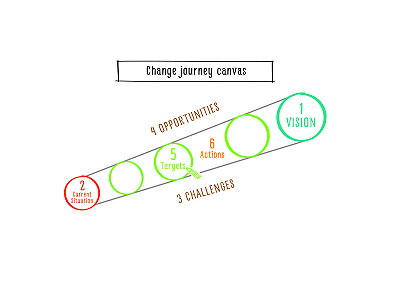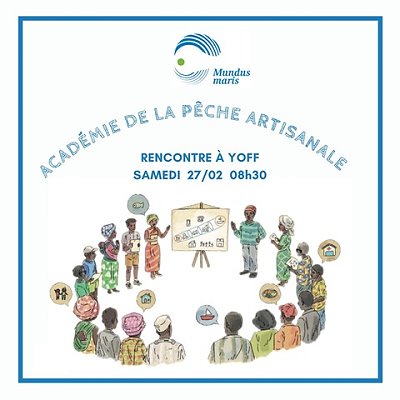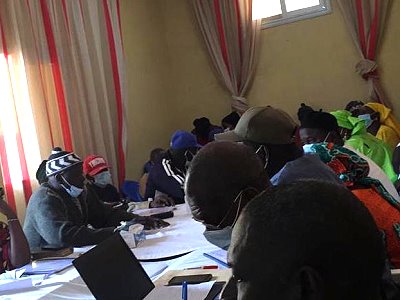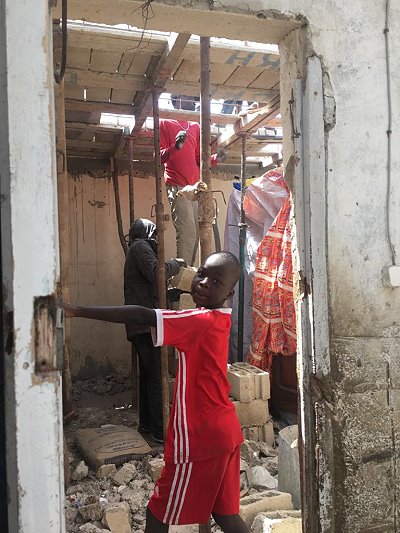 After more than one year without presential trainings of the Small-Scale Fisheries Academy due to the covid-19 pandemic a catching-up workshop was convened with some precautionary measures in Yoff, Saturday, 27 February 2021. This not only helped to reconnect and exchange about what had happened in the meantime with the annual workplans of Academy learners, but it was also an opportunity to try the feasibility of a mixed working method with co-facilitation on the spot and remotely.
After more than one year without presential trainings of the Small-Scale Fisheries Academy due to the covid-19 pandemic a catching-up workshop was convened with some precautionary measures in Yoff, Saturday, 27 February 2021. This not only helped to reconnect and exchange about what had happened in the meantime with the annual workplans of Academy learners, but it was also an opportunity to try the feasibility of a mixed working method with co-facilitation on the spot and remotely.
Settling in after the welcome coffee introductory remarks were offered by Mr. Omar Diène, General Secretary of the association Diamalaye–Yoff hosting the workshop, and Cornelia E Nauen and Aliou Sall, president and and vice-president respectively of Mundus maris asbl. Maria Fernanda Arraes Treffner, principal facilitator remotely connected to Yoff, was supported by the local co-facilitators Marieme Seck, called Soda, Aliou Sall, Soulayemane Sow and Mbor Thiaw. She then introduced the agenda of the day.
 To warm up after the long break, participants watched together the short video summarising key features of the Small-Scale Fisheries (SSF) Guidelines spoken in Wolof. Mundus maris together with the Fisheries Transparency Initiative had arranged for translation of the sound track to make sure the rights and responsibilities could be well understood by the many Wolof speakers in Senegalese fisheries.
To warm up after the long break, participants watched together the short video summarising key features of the Small-Scale Fisheries (SSF) Guidelines spoken in Wolof. Mundus maris together with the Fisheries Transparency Initiative had arranged for translation of the sound track to make sure the rights and responsibilities could be well understood by the many Wolof speakers in Senegalese fisheries.
Participants were then asked to name one element of the video, which had retained their particular attention. The need for cleaning of beaches, fish landing areas and the bottom of the sea, disuasion of bad fishing practices and security were among the most often evoked points. Several participants also mentioned the need for stronger coordination, cooperation and action to address such issues, for getting a voice in management bodies and share resources more equitably. The need for greater social cohesion internally was also mentioned as a prerequisite for adding weight to demands to agencies or management bodies external to the community. Two persons from Hann Academy joined in the discussions as well and appreciated the opportunity to exchange between the groups.
This first exchange was a good recap, why learners adhered to the academy, which offered a dialogue space for discussing challenges and searching solutions together. Cornelia then reminded everybody of the basic principles of the academy: It
 celebrates local culture
celebrates local culture- promotes active learning giving equal opportunity to all actors and communities in the fisheries value chain
- contributes to the co-production of adapted knowledge and local innovations
- catalyses synergies for tangible changes towards gender and social Blue Justice
- connects local concerns to global issues and vice-versa with a view to enable robust solutions that work for people and planet.
The next exercise served to check progress with individual action plans. Most participants had brought their work books and explained to each other first in groups of four what they had achieved and what difficulties and opportunities they had met in pursuit of their objective for the year.
Each group then asked one of their midst to report on his or her change journey. The most informative parts were, how they had coped with unexpected situations they had not considered earlier.
 Several reports illustrated how the pandemic had created setbacks to their savings and investment plans. Some fishers and traders reported that the closure of frontiers and disruptions of supply chains had forced them to use credit intended for productive investment for living expenses. This left them with problems paying that debt.
Several reports illustrated how the pandemic had created setbacks to their savings and investment plans. Some fishers and traders reported that the closure of frontiers and disruptions of supply chains had forced them to use credit intended for productive investment for living expenses. This left them with problems paying that debt.
Some others were luckier because they had diversified into other economic activities such as raising sheep and trade in cloths which had turned out profitable and helped them weather these difficult times.
Nabia, who had already reported on significant economic gains after using the planning method of the academy for only a few months, reported that she had perfected her use of the planning and not only achieved her annual goal of quadrupling her throughput and buy a motorbyke for more efficient marketing, but had also diversified her product range in the market and upgraded her house from corrugated iron to better roofing materials.
Time was insuffient to go very deeply into each story, but it was clearly good to exchange experiences.
The last round of conversations was about the format of this half day workshop and whether it had worked for the participants. Most pointed out that it was acceptable under the circumstances, but that there was room to improve the internet connection and some other logistic aspects.
Monthly gatherings are an option with WhatsApp contacts in between workshops.
Thanking all participants for their patience and flexibility to cope with suboptimal working conditions this first time with partially remote facilitation the workshop was closed.
Infos on the previous session is here.








